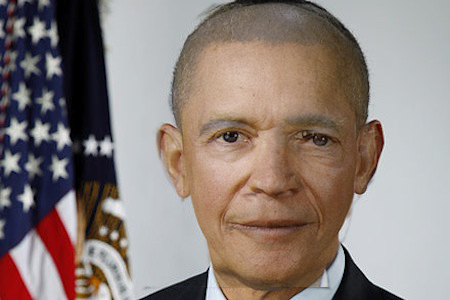Barack D. Eisenhower

Credit: HNN staff.
 When Barack Obama ran for president in 2008, Carolyn Kennedy buoyed his campaign with her endorsement, saying, “I have never had a president who inspired me the way people tell me that my father inspired them.” As well as comparing Obama to Kennedy, admirers likened him to Abraham Lincoln, noting both men’s eloquence and their strong moral compasses, an analogy Obama courted when he launched his presidential bid from Springfield, Illinois. Supporters also compared him to Franklin D. Roosevelt, noting that both men inherited desperate economies they both tried to fix with large infusions of government spending.
When Barack Obama ran for president in 2008, Carolyn Kennedy buoyed his campaign with her endorsement, saying, “I have never had a president who inspired me the way people tell me that my father inspired them.” As well as comparing Obama to Kennedy, admirers likened him to Abraham Lincoln, noting both men’s eloquence and their strong moral compasses, an analogy Obama courted when he launched his presidential bid from Springfield, Illinois. Supporters also compared him to Franklin D. Roosevelt, noting that both men inherited desperate economies they both tried to fix with large infusions of government spending.
But those poetic presidential comparisons have given way to nearly four years of experience with a man who is very different from Kennedy, FDR, or Lincoln, appearing more like a president who’s probably just as misunderstood as he is: Dwight D. Eisenhower.
Sure, Obama is an eloquent Democratic lawyer and Eisenhower was a Republican general who often spoke gobbledygook. But they are both confident and cool-headed. Unlike the hot-blooded Teddy Roosevelt or George W. Bush, both prefer reason to passion. Obama has a professorial detachment. Both presidents also prefer behind-the-scenes decision-making, leading one historian to call Eisenhower the “hidden-hand president.”
Both men also lean to the political center and aren’t afraid to compromise with the opposition party. Eisenhower called himself a “liberal Republican” and was willing to compromise with Democrats such as Lyndon B. Johnson in Congress. “Eisenhower’s political strength as president was his dedication to middle-of-the-road policies,” wrote Tom Wicker in his Eisenhower biography, “and his insistence that he was guided only by devotion to duty and a sense of the national interest.” Obama likes the bipartisan approach, although his efforts have been rebuffed. Both have infuriated the far reaches of their own parties. To the dismay of arch-conservatives, Eisenhower refused to rattle sabers at the Soviets, left the New Deal alone, and signed civil rights legislation. Obama has disappointed many Democratic progressives by failing to push for a single-payer health care system and by offering to cut entitlement programs.
Both presidents also believe the federal government plays an essential role in the nation’s welfare. In 1956, Ike suggested the federal government build a highway system, a proposal that became 40,000 miles of roads and a $25 billion expenditure that would stretch over thirteen years, making it the largest single public works project in American history until that time. In speaking about the effort in his 1963 memoir, Ike sounded like a Keynesian liberal: “Its impact on the American economy -- the jobs it would produce in manufacturing and construction, the rural areas it would open up -- was beyond calculation.” The federal government wouldn’t spend such dollars again on a domestic project until Obama’s 2009 infrastructure infusion, consisting of about a third of his $787 billion stimulus package.
In foreign affairs, Eisenhower was an internationalist, and so is Obama. Eisenhower supported the United Nations and strengthened NATO, had good relations with Arab states, and seemed especially good at managing crises in places such as Hungary and Egypt, moving cautiously, reassuring people rather than frightening them. Obama has sought international alliances, convincing a wide coalition of nations to participate in economic sanctions against Iran to curtail its nuclear program. Obama cautiously maneuvered through the Arab revolutions that arose in January 2011 as he’s also moving cautiously in the Arab-Israeli conflict.
In military issues, Obama also has proven Ike-like. Obama has moved to disentangle the U.S. from unpopular wars in Iraq and Afghanistan. When he announced a drawdown of troops in Afghanistan, President Obama said, “Over the last decade, we have spent a trillion dollars on war, at a time of rising debt and hard economic times. Now, we must invest in America’s greatest resource: our people.” When Eisenhower came into office, the Pentagon urged him to launch a major new offensive in Korea. Instead, he settled for peace. He also rejected a ground war in Vietnam. And after the Soviets launched Sputnik, Eisenhower resisted near-unanimous pressure to pour billions more into the military budget. “Every gun that is fired, every warship launched, every rocket fired,” the general said, “signifies ... a theft of those who hunger and are not fed, those who are cold and not clothed.”
Eisenhower’s presidency might not have had the drama of Lincoln’s, Roosevelt’s, or Kennedy’s, but after eight years in office, Ike left a country both prosperous and at peace. It’s a legacy Obama would be lucky to repeat.
Related Links

